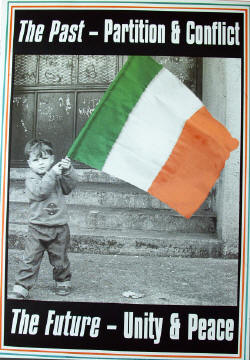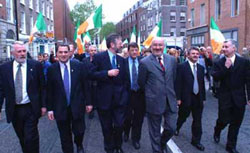 |
Irisch
Republikanische Solidarität
|
 |
Donaldson to align with DUP
Unionist hardliner Jeffrey Donaldson has finally severed his
connections with David Trimble's Ulster Unionist Party, and
will join forces with Ian Paisley's Democratic Unionist Party
in next month's review of the 1998 Good Friday Agreement.
"I am not going to give David Trimble and his cronies the joy
of throwing me out of the party," he declared, referring to
last week's heave against him by supporters of the current
party leader.
The announcement has ended years of internal feuding among
Ulster Unionists. The one-time challenger for the party
leadership predicted that if the party did not topple Mr David
Trimble as leader, then the UUP faced "political collapse".
"If the UUP does not change leader and policy then the DUP
will do to the UUP what Sinn Fein is doing to the SDLP," he
said.
Mr Donaldson said it was a "sad day".
"I have been a member of the Ulster Unionist Party ever since
I was a teenager," he said.
"However, I have come to the conclusion that it is not the
party I joined and it has abandoned the principles I believe
in."
In a statement Mr Paisley welcomed the resignations as "a
momentous decision that will deal a hammer blow to the Ulster
Unionists".
Fellow Assembly members Arlene Foster and Norah Beare also
resigned with Mr Donaldson. Martin Smyth and David Burnside,
two other prominent hardliners in the UUP, are so far
remaining within the party.
Mr Donaldson has rules out a return to the UUP and has
indicated that he would formally join the DUP.
That would meant that in any new executive, under the d'Hondt
system of apportioning posts, the DUP could be entitled to
four ministerial positions, compared to only two for each of
the three other main parties.
"Unionist realignment is the only option now. Otherwise we
could be facing the prospect of Sinn Fein as the largest party
after the next Westminster elections," said Mr Donaldson.
Since the Good Friday Agreement was signed over five years
ago, Mr Donaldson has exerted a uniquely malign influence on
the peace process, openly opposing the Agreement and
successfully pushing for his party to make increasingly
insatiable demands from the IRA.
Some thirteen or fourteen acrimonious meetings of the UUP's
ruling Ulster Unionist Council failed to heal the hopeless
divisions within the party and frutrated the broader peace
process.
Observers believe the resignation could now allow the UUP to
coalesce around a clear policy and negotiate in a meaningful
way in the upcoming talks. However, the concern now is that
the UUP will increasingly be seen as irrelevant as a
Donaldson-supported DUP is now clearly the dominant unionist
party.
Letzte Änderung:
23-Dez-03